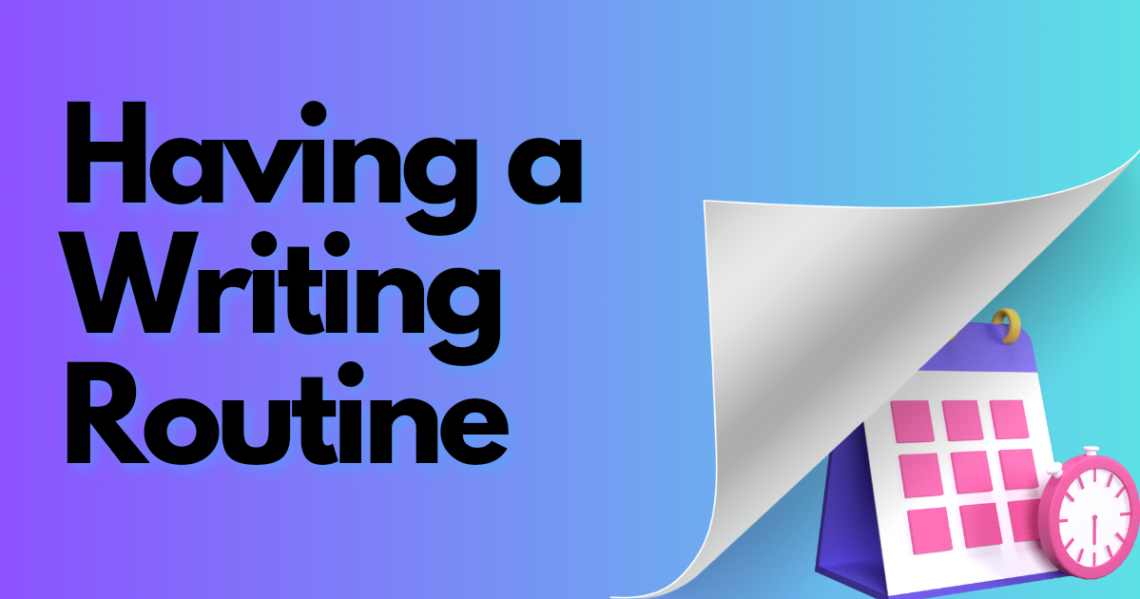
Having a Writing Routine
If you are an aspiring writer or even an accomplished writer, chances are strong that you have said these phrases many times. Well, at least a variation of them.
“I will write later today after I clean my house.”
or
“Just another episode tonight, I will make up the lost writing tomorrow.”
Procrastination. It usually goes hand in hand with a career in writing. Of course, not everyone has a problem with procrastination, but those people are just a bunch of goody-good show-offs trying to prove something.
If you are one of those writers where procrastination follows you around like a lion waiting to pounce, then a writing routine is just for you, which is why I am also writing this article for all writers. After all, we writers need to keep an eye out for each other and support each other, right? Right!
Why Do You Need a Writing Routine?
First, what is a writing routine? Simple: it is a routine that permits you to write at a designated time or place to achieve a specific goal. It is a valuable tool that should be wielded by every single writer. It should actually be used by every person trying to achieve a task that needs repetition, but that is a whole other article on project management and time management.
Second, you need it because of our little friend we just talked about. You know, that little thing that gets in the way of us achieving our goals? No, not Netflix. Well, yes, I mean, Netflix is part of the problem, but it isn’t the root of the problem. It is just a cog in the machine.
Third, the biggest thing I want you to do is don’t feel guilty about procrastination. Procrastination comes to every single human. Yes, EVERY HUMAN. We all just see procrastination at different levels based on our goals and priorities. I actually put some of the blame on society for this. They have set up so many fast-paced and unrealistic standards to live by that it is only natural to build up so much guilt surrounding procrastination. However, society can go sit in a field and twirl. This is your life, your time, your goals, and your mind.
The next thing I want you to do is to continue reading this article. See what I did there? 😉
What Should a Writing Routine Look Like?
Creating a writing routine is pretty simple. It takes little time to come up with a goal, but a lot of energy to stick to it. This is why, when you create a routine, you need to go easy on yourself and take into consideration the energy it takes to stick with it.
Routines can and should be simple. For example, you could wake up early to get an hour of writing. Or you could use your lunch at the office to do so. Maybe thirty minutes when the kids are finally asleep.
Again, each individual will be different, but the focus should be to look at your schedule and carve out some time. The goal is to find some time where you can focus solely on writing and only writing. This may only be one hour a week, but finding that specific block of time where you can tune out the world and focus on your craft is key.
Writing Routine Ideas
- Every Morning: First thing in the morning. Write while coffee is being made and until first cup is complete.
- Lunch Time: Take the first half of the lunch to eat, then take the second half of the lunch to write.
- After Work: Take 30 minutes after you are done with work for the day and write.
- Dinner Prep: While Dinner is in the oven or simmering, sit down at the table and write.
- Weekend Routine: Go to a coffee shop or a small spot in your yard and focus for thirty minutes.
“You don’t have to write. You have permission to not write, but you don’t have permission to do anything else.” – Neil Gaiman
What Should My Writing Goals Be?
During this time, there is no specific goal to have with your writing. It could be writing a chapter, a character arc, outlining part one, or even a designated word count. What is important is that you can look back at the end of the session and feel productive. Which is why I would like to suggest a valuable piece of advice: Start Small.
Yes, start small. When we set small goals, it is more likely we will reach those goals, which in turn helps us feel productive and boosts our confidence and enjoyment of the task.
Quick Math: If you were to write 100 words a day, you would have 36,500 words written in a year. That’s the size of my middle grade novel The Curiosity Collection: A Hairy Encounter.
How to Stick to a Writing Routine
Sticking to a writing routine is easier said than done. Let’s face it, all of us have set goals in our lives and just as quickly not stick to them. Though this is life, priorities change, and time is limited. That is why there is no clear or single way to stick to a writing routine. There are only guidelines and hacks to help you. Each individual will be different in how they achieve this.
Essentially, when it comes to keeping a writing routine, it means letting those loved ones know that it is your time to go write and to not be disturbed. It is your time to go to your office and lock your door. Maybe there is a secret chair in a corner of your office, away from all other eyes. Hell, maybe it is getting in your car and sitting in a Target parking lot. Though that one could be too tempting to walk in and browse the shelves.
It is about putting your dreams, your passion, and maybe even your future career (if you want it as one) ahead of everyone else for thirty minutes or an hour a few times a week.
Though I am not going to lie, the muscle memory needed to create this habit can take a bit of time to build. Using sticky notes, calendar reminders, or even alarms are great ways to tell you to stop what you are doing, close all other tabs, and only have that work in progress open.
Life Hack: If you have a loved one that you can rely on, ask if they can be your alarm. Ask to see if they can take care of dinner on a specific night while you write. Or maybe your parents call you to remind you that it is writing time.
How to Have an Agile Writing Routine
An agile routine means two different things. Flexibility and forgiveness.
Flexibility means knowing that you may not have 7 p.m. free every night to sit at your desk and write. It’s all about knowing yourself and your habits. The better you know yourself and the habits you have, the easier it will be to either bend those habits to your will or, at the very least, work around them. Maybe you play tennis with a friend three nights a week at 6 p.m., and your writing is set to start at 7 p.m. However, your friend loves to gossip and sometimes holds you up from getting to your desk. That is okay. Build in buffers and give yourself the flexibility to maybe start at 7:30 on these days and go a little later. Social lives are important. Not all writers should lock themselves in a room away from all of society, it gives us a bad look if we all do this.
Sometimes things come up in the middle of your writing session. This is also okay. The key is that you are building habits. The stronger the habit you build, the less likely you will be disturbed in the future. Of course, it won’t stop all of life’s little surprises, but it also shouldn’t. The world doesn’t stop because we are writing. We just do our part to mold the world around our habits and routines.
Forgiveness. For the love of baby Zeus! We all need to learn it. Writers are artists, and artists are so damn critical of their work, but even worse, they are more critical of the lack of work they accomplish. I am guilty of this and try every day to practice forgiveness on myself for not meeting the outrageous and arbitrary goal that I have set for myself. This is an incredibly important part of your routine. Be kind to yourself, be forgiving.
Enjoy the Time
Lastly, enjoy the time. All of this means nothing if you aren’t having fun in life and enjoying the process. Sure, we all have our bad days and become frustrated at the process, our work, and even doubt our careers. However, I don’t want you to give up, I want you to write that beautiful novel, those fantastic collections of short stories, and even those highly addictive shows. Selfishly, I want you to write them for me, but more importantly, I want you to write for you.
Enjoy the process, embrace the ups and downs, and live in the moment.
***This is not a paid review. This review is my own personal opinion and thoughts. However, please note that links in this site contains product affiliate links. At no extra cost to you, I may receive a commission if you make a purchase after clicking on one of these links.





